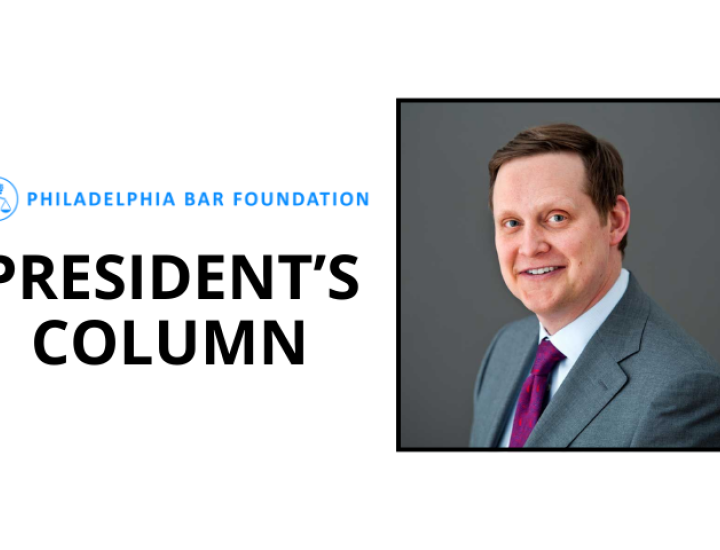Research Grant Provides Vital Support for Philadelphia Legal Aid

By Leslie E. John, partner at Ballard Spahr LLP, and president of the Philadelphia Bar Foundation.
Equal access to justice is expressed in so many ways. One factor that is often overlooked is the need for broad availability of high-quality research tools, which can make a critical difference in case management for people in need. The Philadelphia Bar Foundation is proud to play a role in leveling the playing field in this important area of law. For the past seven years, we have partnered with LexisNexis to make its Research Grant Program available to Bar Foundation nonprofit partners.
The LexisNexis Research Grant Program provides valuable online research time, tools, and training to legal aid lawyers who often lack the financial resources to access the commercially available research platforms used by their counterparts in government and private practice law. The LexisNexis legal research hours provided through the grant program enable recipients to conduct the authoritative research required to develop effective case strategies on behalf of their clients.
The nonprofit organizations that receive these services through the Bar Foundation’s partnership grant with LexisNexis include: the Homeless Advocacy Project, Justice at Work, Legal Clinic for the Disabled, Mazzoni Center Legal Services, Pennsylvania Immigration Resource Center, Philadelphia Lawyers for Social Equity, Philadelphia Volunteer Lawyers for the Arts, Public Interest Law Center, Regional Housing Legal Services, SeniorLAW Center, Support Center for Child Advocates, Women's Law Project, and Women Against Abuse.
These organizations serve the legal needs of so many vulnerable people across our community. And while they are among the most innovative and successful legal service nonprofits in the country, they face a potentially crippling combination of challenges—reduced funding, shrinking budgets, and an ever-rising level of client need. Viewed through this lens, the value of the LexisNexis Research Grant is even greater than the generous dollar figure it represents. Public interest attorneys are being asked to do more with less, and access to expensive, high-quality research tools like LexisNexis is a crucial part of their efforts to effectively and efficiently support their clients.
Those clients are the ones who ultimately benefit from this grant. They are people with disabilities, senior citizens, members of the LGBTQ community, immigrants who have endured torture, survivors of domestic violence, and individuals, children, and families living in poverty. In addition, the public interest legal groups receiving support through the NexisLexis Research Grant often handle cases that affect public policy and address emerging legal needs that further expand access to justice in society.
The Pennsylvania Immigration Resource Center (PIRC) uses the LexisNexis Research Grant to examine case law from the Board of Immigration Appeals, the Third Circuit, and the U.S. Supreme Court that could support claims to relief from deportation. With the help of next-generation technology, PIRC lawyers are better equipped to structure claims involving asylum, withholding of removal, protection under the Convention Against Torture, cancellation of removal for lawful permanent residents and non-residents, and motions to terminate based on improper designations of convictions under legal “terms of art” that are defined by immigration case law.
Regional Housing Legal Services (RHLS) has used the grant to research zoning laws that could be used to advance a housing development benefiting low-income people in the five-county Philadelphia metro area. They are able to review case law and state statutes governing manufactured homes, which low-income clients use at a higher rate than average, and case law and HUD regulations on fair housing and the designation of units for people with autism.
The SeniorLAW Center uses LexisNexis for its caseload of landlord-tenant, homeownership, custody, and victim services matters. In one case, SeniorLAW Center staff attorneys used LexisNexis to inform their representation of a senior citizen involved in an ejectment trial against her son, who had caused extensive damage to the property. The woman held the home’s title in trust for a third party, and the SeniorLAW staff attorney used LexisNexis to research trust and property issues as well as possible new defenses to an ejectment action. Thanks in part to the technical support they received, SeniorLAW Center was successful in obtaining an order ejecting the son from the woman’s property.
Women Against Abuse uses the LexisNexis grant to research legal issues that arise in representing domestic violence survivors in Protection From Abuse, child custody, and support cases. In one instance, a Women Against Abuse attorney used LexisNexis to research the way the Pennsylvania courts have defined unconscious as it pertains to the crime of rape in the Pennsylvania crimes code. The research was a key factor in the legal argument in a Protection From Abuse case that the client was unconscious within the definition of the law and therefore incapable of consent.
These are merely a few example illustrating the importance of the LexisNexis Research Grant Program and the priceless value it provides to the most vulnerable members of society. The Philadelphia Bar Foundation and the agencies that benefit from this research grant are deeply thankful to LexisNexis for its continued generosity and support.
